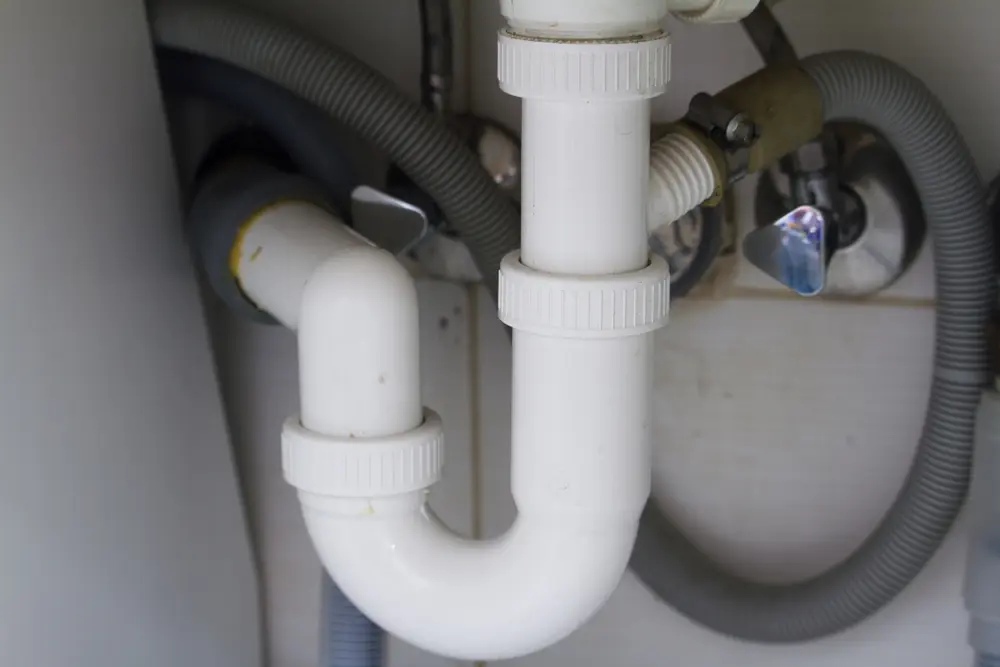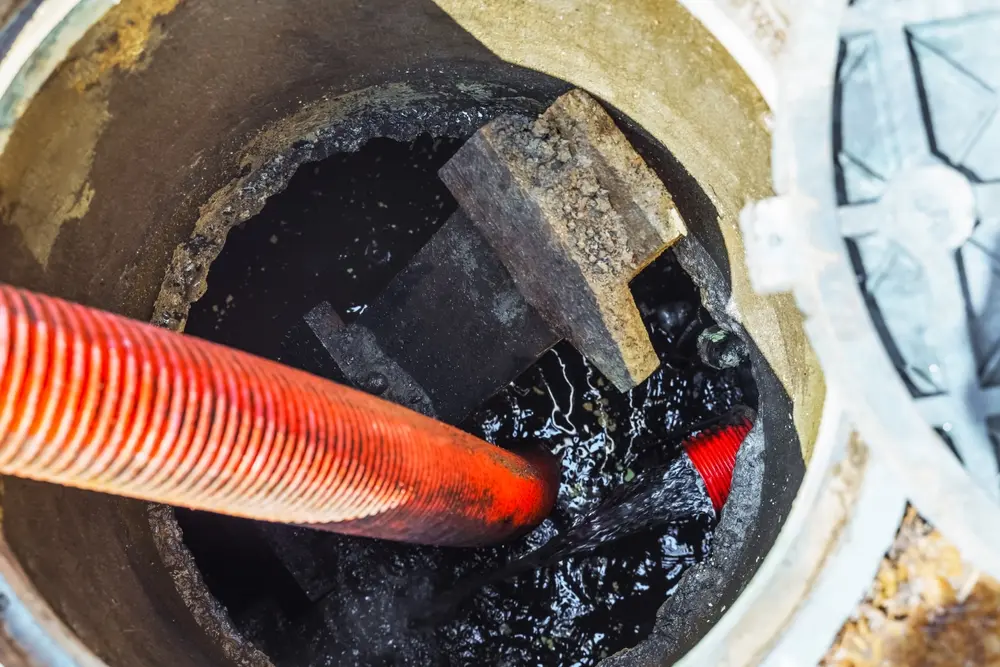Bathrooms don’t always smell like daisies—but if your bathroom is wafting the stench of sewage, it could be a bad sign for your plumbing. If you’ve found yourself in a smelly situation like this, then you’re in the right place. Read on to find out what might be causing this sudden odor and how you get rid of it.
7 Common Causes Behind the Sewage Smell in Your Bathroom
Some bathroom issues can be fixed without a professional, but that’s not always the case. Sometimes a strong sewage smell in your bathroom warrants a call to a plumbing technician. Your sewage smell could be due to:
Clogged Shower Drain
Showers keep you clean, but they can make your drains dirty. Debris such as hair and dirt can accumulate as a drain clog. When these are not cleared out, bacteria can grow and emit a strong sewage-like smell.
Thankfully these drain clogs are usually an easy fix. Simply use a drain snake to remove the clog and your bathroom should smell much better. That being said, deeper clogs may need professional cleaning.

Blocked Sewer Line
A clog in your sewer typically occurs due to elements like a grease buildup or nearby tree roots. When a clog occurs in your sewer line, sewage may back up. With nowhere for odor to go, it’s forced back up into your piping for your smelling displeasure. Clearing out these blockages is best left to a professional plumber.

Dry P-Trap
The P-trap is U-shaped and is located underneath sinks or drains. It traps water beneath the drain, keeping sewer smells from entering the bathroom.
The problem occurs when the water inside the trap dries out. This can happen if you haven’t used your sink in a while. When this happens, sewer smells can enter your bathroom. To fix, simply run water into the sink for about a minute. The smells should go away.

Blocked or Damaged Vent Pipe
Your vent pipe is best described as the lungs of your plumbing system. They provide fresh air circulation while expelling sewer odors. If a clog occurs or the pipe itself is damaged, sewer smells may circulate back into your bathroom. When this occurs, you can typically hear a bubbling or gurgling sound from your pipes. It’s best to call a professional plumber to unclog your vent pipes.

Damaged Toilet Seal
You may have properly heard your toilet seal called the “wax ring”. The seal holds your toilet base to the floor where it connects to the sewer pipe. If broken, the seal allows the sewer gasses to come through into your bathroom.

Full Septic Tank
The septic tank connects to your drainage system, where it receives—and partially treats—your wastewater. When this tank fills up, you may notice the scent of sewage. Other signs of a full septic tank include your toilet running or even the sound of something bubbling around your toilet and draining. The fix for this is to regularly check the levels of the septic tank and perform routine draining.

Build-Up of Organic Matter or Bacteria
Areas like your shower drain are prime spots for debris clogging. Everything from soap scum to fallen hair can accumulate, creating nasty odors along the way. The same goes for food scraps that get trapped in your drains. The organic matter will decay and give off a foul smell. To prevent clogs, avoid flushing non-biodegradable items down the toilet and resist using more toilet paper than needed.

How To Get Rid of Sewage Smell in Your Bathroom
Now that you know what causes a sewage smell, the next question is “How the heck do I get rid of it?”
There are multiple steps to take that help to rid your porcelain throne of those nasty odors:
- Ensure proper ventilation: Open up any nearby bathroom windows and turn on your exhaust fan. By doing so, you circulate the bad smell out of the room.
- Clean your bathroom fixtures thoroughly: If you have recently got your plumbing serviced but a bad smell still lingers, the next best step is to clean. These areas may still have stubborn bacteria left over that emit a sewage-like smell.
- Refill your P-trap with water: Check your trap for any debris clogs, and rinse water through to refill it. The new water will prevent sewer odors from leaking through your sink.
- Inspect damaged or leaky pipes: Look around your plumbing system for any pipes in disrepair. If your search comes up with nothing, it’s best to have a plumber check your pipes for any internal damage.
- Clear blockages in the sewer line: Clear out blockages using safe chemicals to clear out any debris buildup in the sewer line. If the chemicals don’t work, a plunger or plumbing snake can usually clear out the blockages.
- Use natural remedies and DIY solutions: Pour a mixture of vinegar and baking soda straight into the drains, and wait for a few minutes. Afterwards, flush it out using hot water which clears out the smell. You can also use leftover coffee grounds or activated charcoal to absorb the odor. Keep in mind air fresheners will only mask the sewer smell temporarily.
Experienced & Professional Plumbers for Persistent Sewer Smells
If all the cleaning and air circulation in the world still doesn’t make the smell go away, it’s time for professional assistance. Charles Stone’s professional plumbers deliver efficient and effective services to get your bathroom smelling fresh. Utilizing years of experience and the proper tools, we efficiently inspect your system and clear out the source of the smell.
If your plumbing problems don’t just stop at bad smells, our team has you covered. Our plumbing experts provide a wide range of services. From replacing faucets or clearing out your drains, we have a fix for all plumbing woes. Reclaim your plumbing with Charles Stone today.
Charles Stone’s plumbing services are available across Upper Cumberland & the Metro Nashville area, including cities such as Murfreesboro, Antioch, Forest Hills, Oakhill, Cookeville, Franklin, and beyond!
FAQs About Sewer Odors in Your Home
Is the smell of sewage in my bathroom dangerous?
Yes, the smell of sewage is dangerous. Sewer gases include methane, ammonia, and hydrogen sulfide. These are directly harmful to your health, leading to headaches, nausea, and even a potential fire hazard.
How can I prevent sewage smells in my bathroom?
Routine maintenance on your plumbing is your best preventative measure. Here are a few ways you can do maintenance at home:
- Avoid flushing any non-biodegradable items
- Clean pipes out using baking soda and vinegar (monthly for best results)
- Use debris to catch debris when cleaning pipes
- If you have a septic tank, pump it regularly
When should I call a professional plumber for sewer gas smells?
If you do at-home maintenance and the smell continues, it is best to call a professional plumber as your problem is much more complex. Professional plumbers utilize tools and years of experience to find the source of your issue and safely repair it.
Can I fix the sewage smell in my bathroom by myself?
Certain issues like dealing with a dry P-trap can be handled with a quick DIY fix or clearing out a clog with water and baking soda. But certain problems like damage to piping or sewer lines are best left to professional expertise and tools.

